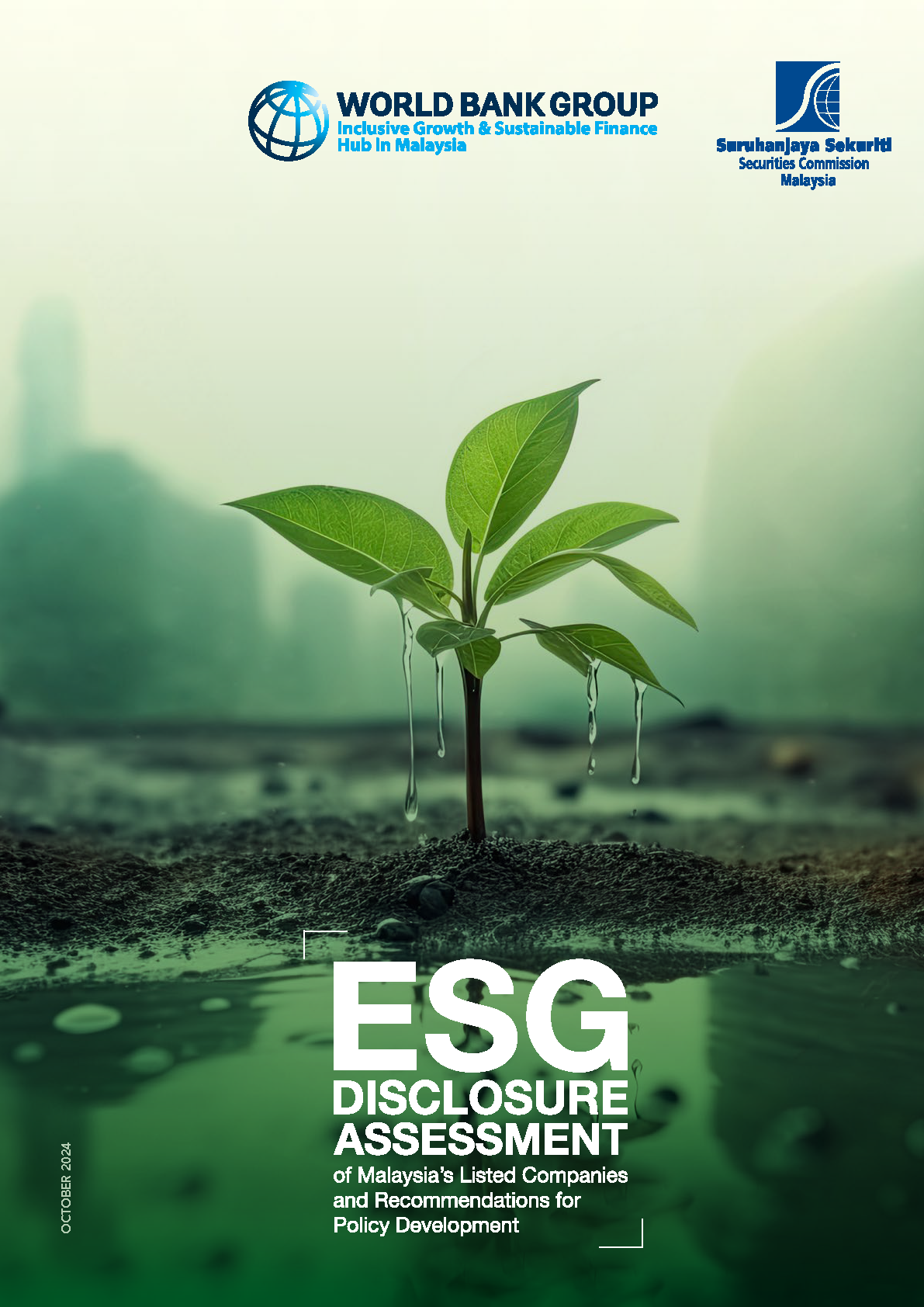
BIX ARTICLE
ESG Disclosure Assessment Report Sets Baseline for Reporting Practices
Oct 15, 2024
|
4 min read
Featured Posts
Social Bonds Illustrative Use-Of-Proceeds Case Studies Coronavirus
Jul 06, 2020
|
2 min read
Sustainable Banking Network (SBN) Creating Green Bond Markets
Jul 06, 2020
|
2 min read
Why is Inflation Making a Big Comeback After Being Absent for Decades in the U.S.?
Mar 24, 2022
|
7 min read
SC issues Corporate Governance Strategic Priorities 2021-2023
Mar 29, 2022
|
3 min read
Kuala Lumpur, 15 October 2024

The Securities Commission Malaysia (SC) and the World Bank have launched a joint report, “ESG Disclosure Assessment of Malaysia’s Listed Companies and Recommendations for Policy Development” at the SC-World Bank Conference 2024 today.
This report provides a baseline on ESG reporting practice in Malaysia, offering key insights for companies and investors to enhance sustainability reporting to align with international best practices and remain competitive.
It aims to analyse the current state of ESG disclosure amongst listed companies and institutional investors, given the growing prominence of ESG and sustainability investments globally.
It also provides reflections and recommendations for policymakers in the Malaysian capital market to foster improved ESG reporting, ensuring relevance and consistency globally.
Speaking at the conference, SC Executive Director of Islamic Capital Market Sharifatul Hanizah Said Ali emphasised the importance of strengthening ESG disclosures amid growing global demand for sustainable investments.
“This joint report reflects our ongoing commitment to fostering a more sustainable capital market. Improved ESG disclosure practices are expected to strengthen investor confidence and ensure that our market remains competitive and future-ready,” she said.
The report was based on an in-depth assessment, conducted between August and December 2023, examining ESG disclosure practices of a representative sample of 90 companies listed on Bursa Malaysia, as well as processes among some of Malaysia's largest asset owners.
It highlights that most Malaysian listed companies had demonstrated good corporate disclosures and solid overall approach to managing governance and social issues.
However, the report also points out gaps in specific environmental indicators, especially those related to climate change and biodiversity.
Other findings from the report include:
- Larger companies1 had significantly better ESG disclosure rates than smaller ones.
- Regulatory compliance was the primary driver of corporate ESG reporting in Malaysia.
- On ESG disclosure practices among four large Malaysian asset owners, the assessment indicated relatively low levels of ESG disclosure. However, interviews suggested greater efforts to strengthen ESG practices and processes other than currently publicly disclosed.
The report concludes with a set of recommendations, including continuous monitoring along with consultations, to ensure effective implementation of the ESG disclosures in line with the recently launched National Sustainability Reporting Framework (NSRF).
Other recommendations of the report include:
- To further support widespread implementation of Bursa Malaysia’s guidelines for sustainability reporting
- To actively encourage development of ESG practices among domestic investors to increase appeal for corporate ESG disclosures
This year marks the 5th installment of the SC-World Bank Conference, which was officiated by Deputy Minister of Investment, Trade and Industry YB Liew Chin Tong.
The conference explores synergies within the capital market and Islamic capital market to bridge funding gaps for micro, small and medium entrepreneurs (MSMEs) and mid-tier companies (MTCs).
It aligns with the SC’s 5-year Roadmap “Catalysing MSME and MTC Access to the Capital Market (2024-2028)”, which aims to support MSMEs and MTCs funding through the capital market.
“Through our knowledge-based collaboration, we aim to support effective policy design and implementation to address the MSME and climate financing gaps, and I look forward to further leveraging the World Bank’s global expertise to support the Malaysian government, financial regulators, and the private sector in developing a more robust and resilient financing ecosystem for MSMEs,” said Dr. Zafer Mustafaoğlu, World Bank Country Director for the Philippines, Malaysia, and Brunei Darussalam.
Over 200 industry players attended the conference, including entrepreneurs, government agencies, venture capital and private equity firms, RMOs, financial institutions, and Government-Linked Investment Companies.
The report is available at https://www.sc.com.my/resources/publications-and-research/esg-disclosure-assessment.
- Based on market capitalisation
Disclaimer
The information provided in this report is of a general nature and has been prepared for information purposes only. It is not intended to constitute research or as advice for any investor. The information in this report is not and should not be construed or considered as an offer, recommendation or solicitation for investments. Investors are advised to make their own independent evaluation of the information contained in this report, consider their own individual investment objectives, financial situation and particular needs and should seek appropriate personalised financial advice from a qualified professional to suit individual circumstances and risk profile. The information contained in this report is prepared from data believed to be correct and reliable at the time of issuance of this report. While every effort is made to ensure the information is up-to-date and correct, Bond and Sukuk Information Platform Sdn Bhd (“the Company”) does not make any guarantee, representation or warranty, express or implied, as to the adequacy, accuracy, completeness, reliability or fairness of any such information contained in this report and accordingly, neither the Company nor any of its affiliates nor its related persons shall not be liable in any manner whatsoever for any consequences (including but not limited to any direct, indirect or consequential losses, loss of profits and damages) of any reliance thereon or usage thereof.
YOU MAY ALSO LIKE
ARTICLE
Feb 13, 2026
|
4 min read
ARTICLE
Jan 21, 2026
|
4 min read
ARTICLE
Jan 14, 2026
|
5 min read
ARTICLE
Dec 23, 2025
|
5 min read


